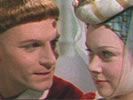Eye For Film >> Movies >> Henry V (1944) Film Review
Henry V
Reviewed by: Scott Macdonald

Laurence Olivier's adaptation of Henry V is the first entirely serious presentation of Shakespeare within the sound era - there were previous efforts, most notably The Taming Of The Shrew and Romeo And Juliet, but they pale in comparison. Olivier's film is a lavish, luxurious entertainment, adapting Shakespeare's most popular history with lashings of style, wit and theatrical skill, all shot in Glorious Technicolor.
By manufacturing his film within a glorious theatrical falsehood and using the Chorus to appeal to our imaginations to fill in the blanks - "Your humble patience pray, gently to hear, kindly to judge, our play" - Olivier allows his film to save money. This frugality means he could afford a giant battle and give justice to the spirit of the text. Elegantly cut in half by Dallas Bower and Alan Dent, this is no grandiose bum-number, like Kenneth Branagh's (admittedly, pretty bloody brilliant) Hamlet. It is tight, well-realised and unconstrained by performance or size of vision. It is an epic, the kind we enjoy so readily and easily with the advent of CGI, but forgive, nay, embrace, the primitive visuals when the vision is there to keep up.

In an inspired storytelling device, Olivier opens his telling using a model of London. The camera slowly pans across it, letting the viewer take in the full sweep of the city. A historical London, which at the time of shooting was previously devastated by the Blitz. We slowly pan towards the Globe Theatre - unseen by the 1944 audience, but familiar to us these days - and watch as a small, unmoving, static flag is raised on the model. It cuts to a full size flag, flapping in the wind. This cut is so audacious, so silly that we appreciate that all the film seeks to do is put on a good show.
The first act is performed on the Globe Theatre stage and the film delights in showing us the fallacies that go hand in hand with acting live - a boisterous audience, the silent, but tumultuous hive of backstage activity and actors losing their lines, quite literally across the stage. Such theatrical fun pre-dates Shakespeare In Love by 50-odd years and does what it did better.
But again, Olivier sidesteps this once he's had his bit of fun. In a sweeping dissolve that reminds the viewer of the masterful jump cut in 2001: A Space Odyssey, the film jumps right into the fantasy, with painted backdrops, full - if joyously primitive - sets and a belief in itself such that it is easy to enjoy the film without being distracted by its elegant crudity. The costumes are a kaleidoscope of chrominance, transferred superbly to three strip Technicolor in all their richness. The production values, while done on the cheap, take the breath away.
Shakespeare's barbery and zesty language survive the cinematic translation - all the expert wordplay, the poetic couplets and solliloquies of raw power. Director Olivier embellishes it from time to time, using cinematography and situation to great effect. The famous "Once more into the breach, dear friends" speech is delivered on horseback, with the king dashing into the breach to back up his words with actions. Olivier is a terrific Henry V, who imbues Shakespeare's blood and thunder soliloquies with authority - watch, even in the first act, as he spits out threats to the French messengers, turning the word "mock" into a verbal weapon.
Much criticism has been levied on the cuts to the original text (most of which are restored in Branagh's excellent 1989 revamp) regarding the charges against the king for rushing into war. Henry V is very much a product of its time, with much of these cuts suggested by Winston Churchill himself as a stirring speech to the soldiers of WWII.
"We would not die in that man's company that fears his fellowship to die with us." Jingoistic, but powerful, and masterfully performed.
If Shakespeare was a 20th century man, he would be a filmmaker. Since he isn't, Olivier does him proud.
Bravo!
Reviewed on: 28 Jul 2007
















